Africa
The UN High Commissioner for Human Rights Michelle Bachelet in her first address to the Human Rights Council since taking office enumerated rights issues and violations across the world.
In her opening statement as at the 39th session of the Human Rights Council on 10 September 2018, she singled out a number of African countries that had grave concerns relating to the human rights situation.
Except for southern Africa, every other bloc of the continent had a share of rights violations. Africanews reproduces portions of the statement that points at human rights hotspots across the continent.
Egypt’s death sentences
In Egypt, I am shocked by Saturday’s death sentences for 75 people, following another mass trial which failed to comply with international standards regarding due process guarantees.
The trial of these protesters contrasts sharply with a recent law that bestows immunity on senior members of the security forces for human rights violations which they may have committed.
Rights abuse and extrajudicial killings in Mali
In Mali, particularly in the central part of the country and in the region of Menaka, human rights and basic security are sharply deteriorating as a result of violence across intercommunal lines; attacks by violent extremist groups; the use of improvised explosive devices; and counter-terrorism operations conducted by national and international forces, which do not always respect the human rights of the people.
Credible allegations have been made regarding the extrajudicial executions of at least 77 people since the beginning of 2018. The Government has opened judicial investigations for most of these incidents, and the Office will be closely following up these and other cases.
Cameroon’s Anglophone crisis worsening
The situation in Cameroon has also worsened in recent months, as fighting has intensified in the so-called Anglophone regions between security forces and armed groups, with a large number of civilian victims and over 180,000 people forced to take refuge far from their homes – now in pressing need of humanitarian assistance.
Many economic activities across these regions are now paralyzed. In this volatile security context, many people fear reprisals if they participate in the Presidential elections scheduled next month.
The Government has not acted to promote the conference on dialogue suggested by religious leaders, and there is still no mechanism in place which could envisage a halt in hostilities in the short term.
We strongly condemn reports of the killing and abductions of teachers and students and the destruction of schools by armed elements in the north-west and south-west regions. These acts of intimidation are preventing thousands of children from attending school. We note that the
Government has opened investigations into several atrocious crimes apparently committed by members of the military, and urge swift and effective action to ensure all the perpetrators of human rights violations are held accountable.
Due process should also be guaranteed for all those detained in connection with terrorism, and we urge the Government to address key grievances, in order to foster peaceful resolution of this crisis.
Renewed violence in Sudan’s Darfur
In Sudan, clashes in Jebel Marra between security forces and armed groups have again led to new displacements of people in recent months. Despite some improvements in overall security in Darfur, displaced people continue to be subjected to attacks, including killings and rapes, when they venture outside their camps.
Many such attacks are attributable to Government security forces and related militias, which still operate with impunity in Darfur.
South Sudan’s rights issues
In South Sudan, the agreement signed by the warring parties last month has again raised hopes for a peaceful and sustainable solution to the conflict.
We urge the parties to acknowledge their part of responsibility for the violations suffered by so many across the country, by helping to establish and operationalize thelong-awaited Hybrid Court – notably, by signing its statute.
We are deeply concerned by the general amnesty announced by President Kiir in Khartoum, which may result in protecting from justice a large number of perpetrators of serious human rights violations and abuses from both the government forces and armed groups.
We remind the authorities that amnesties may not shield from prosecution individuals who may be criminally responsible for war crimes, genocide, crimes against humanity or gross violations of human rights, including gender-specific violations.
The Commission on Human Rights in South Sudan will hold an interactive dialogue with the Council later on the session. We join the Commission in deploring the fact that peace efforts have largely ignored accountability as a lever for change.
Somalia – attacks by state and non-state actors
In Somalia, continued attacks against civilians by both State and non-State actors are deeply concerning. In July, UNSOM documented 51 civilians killed and 82 injured, and noted that civilian casualties attributed to Al-Shabaab had increased 309 per cent since June, and those attributable to state actors had risen by 125 per cent.
The Office is also extremely concerned by the very limited democratic space in Somalia. An UNSOM report this month on violations of freedom of expression notes that between 1 August 2016 and 31 July 2018, at least eight journalists and media workers were killed and 32 injured; 94 individuals were arbitrarily arrested and/or subjected to prolonged detention on charges related to their exercise of freedom of expression; and 19 media organs were forced to close, some temporarily.
A report published by UNSOM and the Office in August details numerous human rights violations and abuses committed during the 2016 and 2017 electoral process, including 44 cases of killings of community leaders and electoral delegates.
Need to probe sporadic clashes in Central African Republic
In the Central African Republic, sporadic clashes between armed groups outside the main towns continue to expose civilians to atrocity crimes and protection concerns. We deplore recent attacks against humanitarian workers in the Central region of the country.
Clashes in August and September between ex-Seleka and anti-Balaka forces in Bria last month caused multiple civilian casualties and the reported destruction of villages, resulting in forced displacement of their inhabitants.
In the context of current peace initiatives, we emphasise the importance of ensuring that any agreements comply with human rights law, address the importance of people’s safety, and ensure that the perpetrators of human rights violations and abuses will be held to account.
Those who have incited violence and hatred between communities should also be held accountable. The Office is ready to support the establishment of inclusive and victim-centred transitional justice.
Brief on Burundi and DRC situations
Burundi continues to enforce increasing restrictions on an already gravely-threatened civic space, amid continuing reports of grave human rights violations.
In another very worrying development, the Imbonerakure militia responsible for multiple abuses is now increasingly acting as a law enforcement body.
In the Democratic Republic of the Congo, widespread violations of civil and political rights endanger the credibility of the electoral process. The Council will be briefed on issues in these two countries later in the session.
Hope after Ethiopia – Eritrea peace, but need to address rights and justice issues
The Joint Declaration of Peace and Friendship signed in July between Eritrea and Ethiopia offers hope for an end to the decades-long stalemate between the two countries, which has had very severe impact on the people on both sides of the border.
The Office stands ready to support both countries in protecting human rights. We particularly look forward to seeing an end to indefinite conscription into the Eritrean military.
In Ethiopia, the Office has recently visited regions affected by intercommunal violence between the Gedeos and the Gujies communities, where recent clashes have reportedly forced over a million people to flee their homes.
We welcome initial steps taken by the Government and urge a thorough, impartial and independent investigation into the human rights violations which allegedly occurred, with full accountability for the perpetrators.



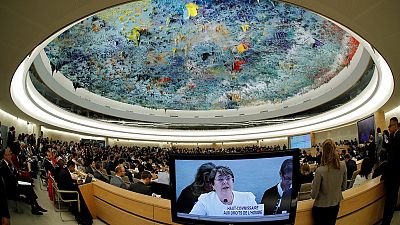

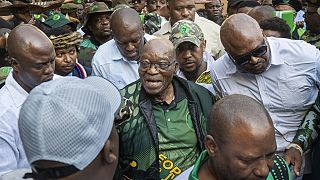
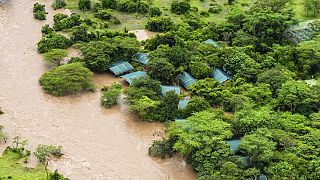

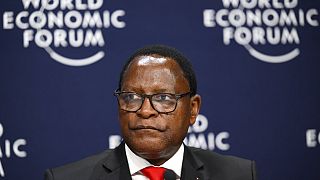
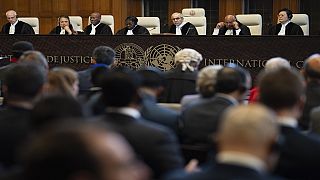

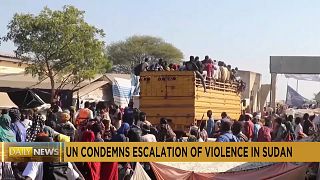
01:45
UN forecasts improved prospects for the world economy
01:22
UN entrepreneurship forum focuses on innovation and growth
01:00
Thousands in Mali replaster the Mosque of Djenne
01:45
Mali: Residents re-plaster Great Mosque of Djenne to save heritage site
01:00
Mali national dialogue recommends junta rule extension
Go to video
Africa: New study suggests climate change could mean declining malaria risk